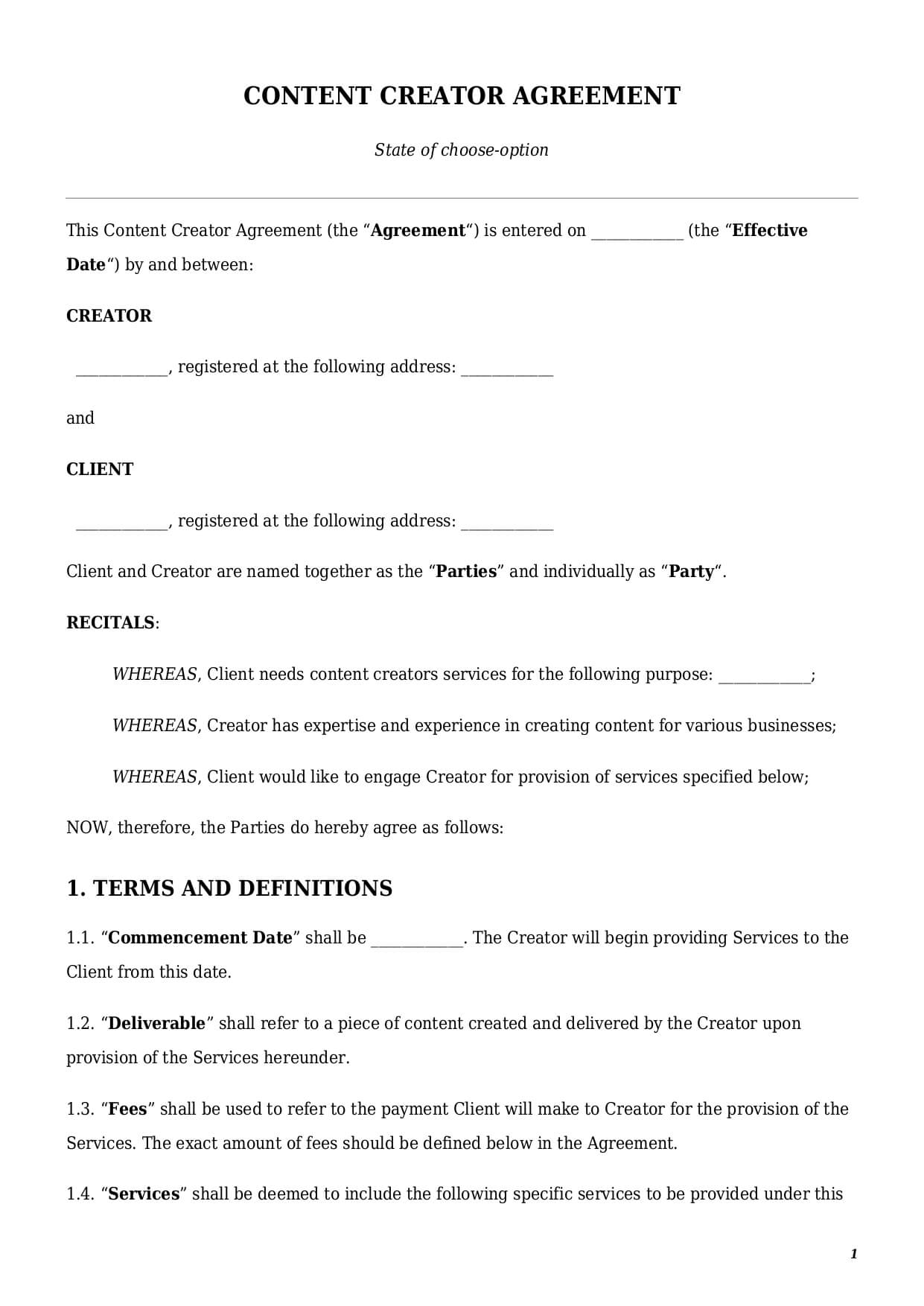Content Creator Agreement
Reviews


What is the Basic Content Creator Contract?
A Content Creator Agreement is a legally binding contract that defines the provision of content creation services for social media, websites, and other online platforms between the client and the content creator. This agreement sets out the list of essential clauses for a content creation collaboration:
- details of the parties involved (client and creator);
- scope of content creation services;
- description of final deliverables;
- duration of creation campaign;
- division of intellectual property rights;
- termination clause.
Depending on the nature and complexity of relationships, a content creation contract template may also have additional clauses. For instance, parties may need a confidentiality clause to protect information with limited access against potential disclosure. On top of that, the parties may need to limit a creator’s ability to work for a client’s direct competitors.
In simple words, a content creator agreement is used to hire a service provider to write a specific piece of content for a website or online platform (e.g., new posts, sales pages, product descriptions, or social media posts).
Therefore, it is a common practice to use the present contract in conjunction with an SEO contract. Under an SEO contract, a client hires an SEO professional to build efficient SEO optimization strategies. As a part of an optimization strategy, a client might be required to create content online. This is where a content creator agreement could help.
The parties to a content creation agreement are the client and the content creator. The client is usually an individual or business that orders the creation of a piece of content. The creator is a freelancer, digital marketing agency, and professional copywriter who can provide requested services.
A content creator agreement template could be helpful in either of the following situations:
- creation of content for social media influencers (e.g., Instagram, TikTok);
- creation of promotional videos for start-up or online businesses;
- blog writing or brand collaboration and many more.
How to draft a content creation contract template?
Neither federal nor state law defines the exact list of clauses and conditions a content creation contract template should have. Without the clauses listed below, a content creation agreement cannot be complete and a legally binding contract:
Details of the Parties
The contract should clearly identify the identities of the creator and the client, including their full names, addresses, and contact phone numbers. In fact, this clause defines who is ordering services and who is going to pay for such services.
Along with the parties’ details, the parties have to insert their signatures. It does not matter if a party puts a signature by hand or using an online e-signature tool. Finally, parties should include the date of signing the agreement.
Scope of Services
A clearly defined scope of work under the contract avoids misunderstandings, where the client expects additional work not originally agreed upon. We advise including the following clauses to define the scope of services as clearly as possible:
- where services should be provided (e.g., in the office, remotely);
- how many rounds of free edits a client should have;
- type of content that should be created.
It is also good to remember that while creating content for social media platforms, a creator might be required to follow platform-specific requirements. Therefore, such an obligation should be additionally articulated in the text of the final contract.
Under a content creation contract template, a creator is prohibited from engaging subcontractors. At the same time, a client may also ask a creator to engage certain employees in the provision of the services.
Final Deliverables
Final deliverables are the results of the work performed by the creator. They could have various forms—e.g., news posts, blog posts, descriptions, etc.
Final deliverables upon provision of the services should be free of plagiarism. In this regard, a content creator agreement usually includes a set of covenants by which a creator guarantees creation of the work on their own.
A well-drafted content creation contract template should define the following additional elements:
- tone of voice in which content should be written;
- delivery method (e.g., Google Drive);
- file format (e.g., PDF, Word);
- quantity of deliverables and their frequency.
Payment Provisions
The payment terms clarify how and when the content creator will be paid. There are various forms in which a creator’s remuneration could be fixed:
- fixed fee;
- hourly rate;
- weekly rate;
- daily rate; or
- monthly rate.
Apart from the type of fee, the parties should clearly define when exactly a client should pay. As a rule of thumb, a simple content creator contract includes a clause according to which a creator should invoice the client for the provided services. A client in its turn undertakes to pay for rendered services from within a few days to a few weeks, depending on the parties’ arrangement.
It is also vital to define the list of acceptable payment methods that could be used by the client.
Duration and Termination
Content creation services could be provided as a one-time project or on an ongoing basis.
The creator can start provision of services on the date of signing this agreement or on any later date. If a content creator agreement is for a one-time project, a clear deadline should be provided in the text of a document. In that case a creator should deliver deliverables by the agreed deadline.
If a contract is for an ongoing project, in this situation the contract should include a detailed schedule according to which services should be provided or the list of milestones.
Any content creator agreement could be terminated by either party. In order to initiate a termination, a party should send a prior written notice to another party informing them about the termination. A notice period could be from a few days to a few weeks, depending on the parties’ arrangement.
How to customize the Content Creator Agreement template at FasterDraft?
In order to create a personalized document template, follow a few easy steps below:
- Click the button “Create Document.”
- Answer simple questions in the questionnaire.
- Select a document’s format—Content Creator Contract PDF or Word.
- Make a payment.
- Download a personalized document.
Table of content
Frequently Asked Questions (FAQ)
-
1. What is a content contract?
A content contract, also known as a content creation agreement, is an official document according to which a client engages a content creator to provide specific services for their website or other online platform.
A content creation agreement is a special type of a general services agreement. Under a service agreement, one party provides certain services to another party in exchange for remuneration.
-
2. Should I include a confidentiality clause in the content creation agreement template?
A confidentiality clause is an auxiliary clause, which means that the document can remain valid and legally enforceable even without that clause.
A confidentiality clause is usually used to protect a client’s sensitive information against further disclosure. Therefore, it is for you to decide if information exchanged in the course of collaboration should be additionally protected or not.
It is also possible to sign a separate non-disclosure agreement (NDA) instead of including a confidentiality clause in the contract. An NDA provides a strict legal framework to protect a client’s sensitive information.

Looking for something Different?
Start typing to find out our collection of legal documents and contract templates
